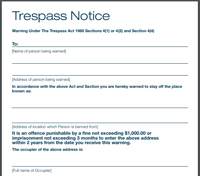Buy Self-help legal documents

This article is focused on New Zealand law and explains issues from a Common law perspective.
How to deal with trespassers within New Zealand
Introduction
If somebody is interfering with your rights as an occupier of land by entering your property you have remedies available to you under the New Zealand TRESPASS ACT 1980.
Trespass after being given a warning to leave
If a person is trespassing on your property you should warn the person that he or she is trespassing and that you will call the Police if he or she does not leave. If the person then refuses to leave, the person commits an offence against the Act.
However, the person has a defence if he or she proves that it was necessary to remain for his or her own protection or the protection of some other person, or because of some emergency involving his or her property or some other person's property.
Issuing a trespass notice (a "warning to stay off")
If the person has left your property and you want to prevent future trespassing you should serve a trespass notice on the person (this is referred to in the Act as a "warning to stay off").
The law entitles you to deliver a warning to stay off your property if the person is trespassing or has trespassed, in which case the warning must be given at the time of the trespass or within a reasonable time after it. You may also give a warning to stay off if you have reasonable cause to suspect that a person is likely to trespass.
Once you have given a warning to stay off, the person commits an offence if he or she enters your property within two years of the warning.
Although it is advisable to issue the person with a written trespass notice, a legally effective warning to stay off can be given orally. A written trespass notice must be given to the person directly or be sent by registered mail.
Warnings from the court to stay off
If a person has been convicted of an offence against the Act in relation to any place, the court can warn the offender to stay off that place, in which case the person commits a further offence if he or she enters the place within two years of the warning.
Defences to trespassing after a warning to stay off
A person charged with trespassing after a warning to stay off will have a defence if he or she proves that:
- the person who gave the warning, or on whose behalf it was given, is no longer an occupier of the property, or
- the trespass was necessary for the defendant's own protection or for the protection of some other person, or because of some emergency involving the defendant's property or that of some other person
Who can exercise the rights against trespass under the Act?
You are able to take action against a trespasser if you are an "occupier" of the land. Therefore the protection under the Act applies not just to owners of property but also to tenants and licensees (a "licensee" is a person who has permission to be on the land).
The defence of "consent"
A common defence against a charge under the Act is that the occupier consented to the person going on to the property. It is important to remember that everybody has an implied licence (that is, permission) to walk up the path and knock on your door. You then must ask the person to leave and give him or her reasonable time to leave at the most convenient exit before the person becomes a trespasser.
Further information may be seen on the New Zealand Police website.
View the Trespass Act 1980 Act (1st July2013) .
Cautionary notes
- Legally, you have the right to sue a trespasser for the tort of trespass to land. However, because of the costs involved this is unlikely to be a sensible option unless the trespasser has caused substantial damage and you want compensation. A lawyer will advise you of the merits of your case.
- Depending on your particular situation there may be other avenues that you can take. You may be able to take action under the HARASSMENT ACT (see How to stop harassment). Further, the DOMESTIC VIOLENCE ACT may in some cases provide protection against those with whom you are in a "close personal relationship" even though you are not living with the person (see How to obtain a protection order under the Domestic Violence Act). A lawyer will be able to advise you as to whether either of these options apply in your situation.
HowToLaw has partnered with JustAnswer.com
Here you may discuss your legal issue with Lawyer specialising in Family, Employment, Immigration, Property, Business, Consumer Protection, Estate Law and more.














